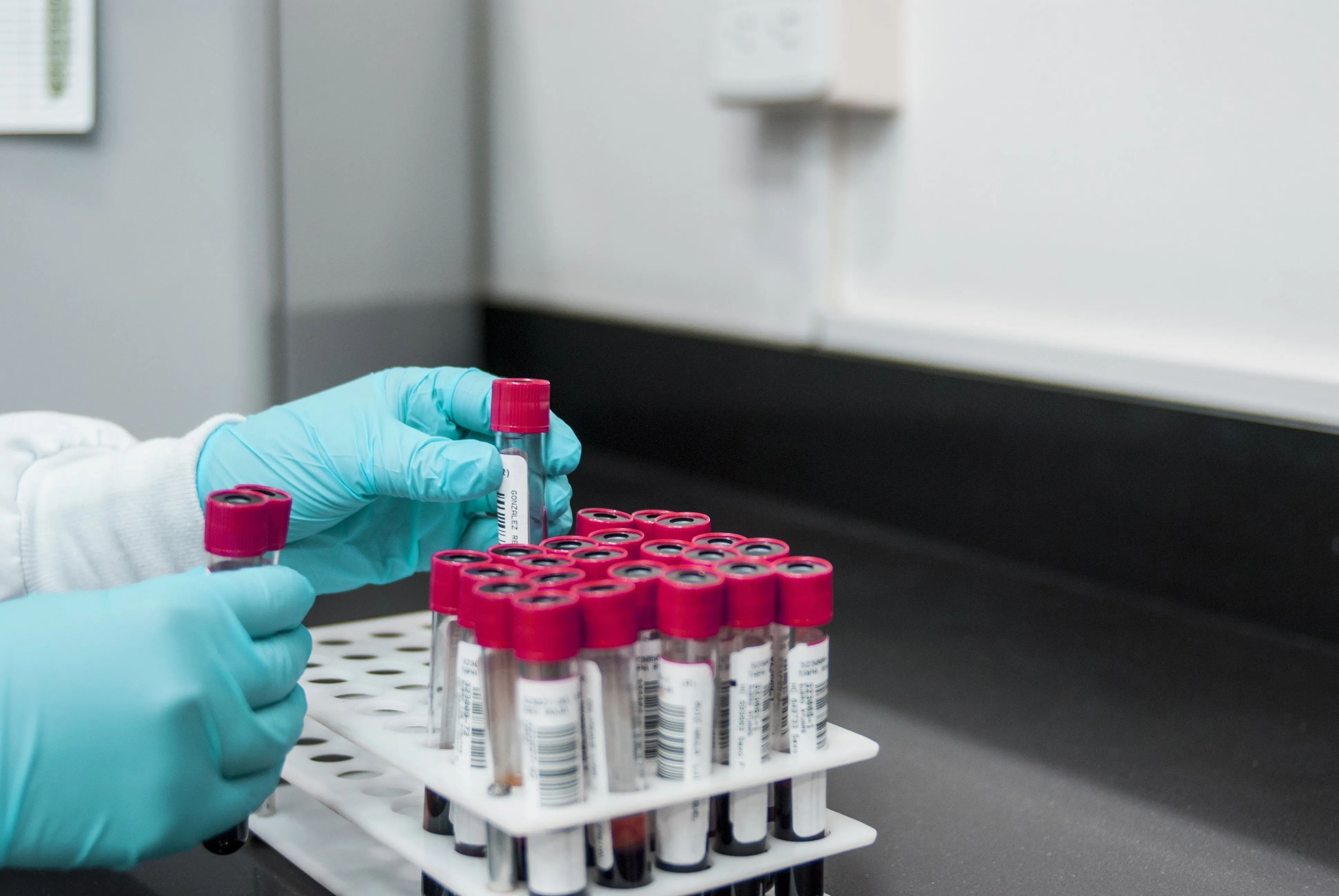Advanced Lab Tests That Redefine Care for Hashimoto’s Thyroiditis
Get Personalized Insights

Advanced Lab Tests That Redefine Care for Hashimoto’s Thyroiditis
Many patients with Hashimoto’s thyroiditis believe that, after diagnosis and regulation of thyroid hormones with medication, they will overcome the low energy levels, weight disorders, fatigue, and mood swings caused by the disease. This is indeed true for some patients, but not for all.
However, many patients with Hashimoto's thyroiditis continue to experience debilitating symptoms, despite having normal blood tests, even after taking thyroid hormones [1].
This is because deficiencies and metabolic disorders, which are not easily detected by standard lab tests, can go unnoticed for many years and affect body weight, energy levels, and mood in patients with Hashimoto’s thyroiditis [2].
Hashimoto’s disease is one of the most common autoimmune disease. It occurs when the immune system mistakenly attacks the thyroid gland.
The gradual destruction of the gland by the immune system, usually over years, ultimately leads to hypothyroidism.
Main factors that contribute to the onset of Hashimoto’s
There are four main factors contribute to the onset of Hashimoto’s thyroiditis [5-12]:
- Reduced metabolic rate (slowed metabolism), due to oxidation and deficiencies in vitamins and other elements
- Insulin resistance
- Lack of vitamin D3 and micronutrients (vitamins, minerals, trace minerals, amino-acids, antioxidants, fatty acids, probiotics)
- Mental stress
These four factors negatively affect the function of thyroid cells. Acting for long periods, they alter the composition and morphology of thyroid cells and deregulate the functioning of the immune system.
Hashimoto's thyroiditis, a common autoimmune condition, requires a care approach that goes beyond mere hormone regulation. Identifying and correcting the accompanying micronutrient deficiencies and metabolic disorders is essential. Without addressing these factors, patients may face a gradual deterioration in their health.
This comprehensive approach typically requires sustained effort over months but leads to significant and lasting improvements in peoples’ lives.
If these factors remain unaddressed, the disease may progress through cycles of exacerbation and remission, leading to gradual deterioration that burdens patients’ daily life and overall health.
Advanced Lab Testing to Detect Deficiencies and Metabolic Dysfunctions Related to Hashimoto’s Thyroiditis
Identifying and correcting metabolic dysfunction requires comprehensive lab testing that profiles metabolic status, inflammation, and micronutrient levels. These tests reveal the factors driving the development and expression of Hashimoto’s thyroiditis. An individual’s metabolic state is the leading risk factor for disease onset [13–15].
Many of these tests are uncommon in standard healthcare. Advanced panels are needed to accurately detect deficiencies and metabolic disorders in people with chronic conditions like Hashimoto’s.
This type of analysis is not comparable to routine checkups. These are highly specialised and far more comprehensive tests, usually performed only in select private clinics at very high prices. Kyma is among the few companies nationwide that offer this level of comprehensive, advanced lab testing by partnering with leading, certified partner labs such as Randox Health.

Key Factors Identified by Kyma’s Comprehensive Lab Testing
Kyma’s comprehensive lab panel detects metabolic disorders that promote the development of Hashimoto's disease, including [16-21]:
- Micronutrient Deficiencies: Lack of vitamin D, vitamin C, selenium, zinc, antioxidants, and omega-3s are linked to impaired immune system function, inflammation, and the health status of patients with Hashimoto's.
- Difficulty in Metabolising Simple Sugars: Excessive consumption of simple sugars beyond what the body can metabolise triggers inflammation and is a significant indicator of the disease's progression.
- Insulin Resistance: Elevated insulin levels disrupt immune system function, worsen autoimmunity, and accelerate gland destruction.
- Fatty Acid Metabolism: The ratio between omega-3 and omega-6 fatty acids is a crucial indicator of the body's ability to manage inflammation and regulate the immune system's normal response.
- State of the Microbiome: Alteration of the microbiome is linked to impaired immune system function and the ability to distinguish between its own tissues and external elements, such as pathogens and viruses.
- Thyroid Antibodies: Elevated anti-thyroid peroxidase (anti-TPO) and anti-thyroglobulin (anti-TG) antibodies reflect autoimmune activity and correlate with disease severity and progression risk.
Modern management of Hashimoto’s disease focuses on the restoration of the above factors, using medical interventions in lifestyle and nutrition with the aim of correcting deficiencies, in order to maintain the optimal metabolic state of the body.
In our clinical experience, this root-cause approach can lead to several benefits:
- Improved management of the disease, protecting the thyroid gland from further damage.
- Better functioning of the remaining thyroid gland, helping the body adjust its metabolism to daily needs and enhancing life quality.
- A gradual decrease in autoantibody levels.
- Reduction in fatigue and a boost in energy levels.
- Enhanced mood and fewer severe emotional fluctuations due to improved gland function.
- Lowered risk of harm to other organs and less chance of developing additional autoimmune diseases.
- Increase in metabolic rate and maintenance of a healthy body weight.
- Better response to medications.
It usually takes 6–8 months to achieve significant change, one year to stabilise the body at a better functional level, and about two years for optimal results.
As dysfunctions and deficiencies are corrected, the body reactivates regular metabolic processes and develops different needs. As care begins, changes occur in multiple metabolic pathways simultaneously. These changes must be identified and appropriately managed to continue the restoration process. Otherwise, the body’s restoration processes do not progress, significantly delaying health improvement.
Through our clinical experience, we have found that correcting the body’s deficiencies in vitamins and other elements, restoring metabolism, and regulating weight to normal levels can radically change the course of Hashimoto’s disease for the better and improve patients’ quality of life, shifting from steady worsening to steady improvement.
Promptly addressing the above issues is critical to halting the progression of the disease.
References
- Persisting symptoms in patients with Hashimoto’s disease despite normal thyroid hormone levels: Does thyroid autoimmunity play a role? A systematic review. Karelina L. Groenewegen et al. J Transl Autoimmun. 2021.
- Micronutrient deficiencies in patients with COVID-19: how metabolomics can contribute to their prevention and replenishment. Dimitris Tsoukalas and Evangelia Sarandi. BMJ Nutri Prev Heal. Nov. 2020; bmjnph-2020-000169
- Metabolic pressure and the breach of immunological self-tolerance Veronica De Rosa, Antonio La Cava & Giuseppe Matarese.18 October 2017.
- Correlation Between Hashimoto's Thyroiditis-Related Thyroid Hormone Levels and 25-Hydroxyvitamin D Guanqun Chao, Yue Zhu, Lizheng Fang. Front Endocrinol (Lausanne). 2020 Feb. https://pubmed.ncbi.nlm.nih.gov/32117049/
- Multiple Nutritional Factors and the Risk of Hashimoto's Thyroiditis Shiqian Hu, Margaret P Rayman. Thyroid . 2017 May. https://pubmed.ncbi.nlm.nih.gov/28290237/
- Improving the Vitamin D Status of Vitamin D Deficient Adults Is Associated With Improved Mitochondrial Oxidative Function in Skeletal Muscle Akash Sinha et. al. J Clin Endocrinol Metab . 2013. https://pubmed.ncbi.nlm.nih.gov/23393184/
- Enhanced oxidative stress in Hashimoto's thyroiditis: inter-relationships to biomarkers of thyroid function.Rostami R1, Aghasi MR, Mohammadi A, Nourooz-Zadeh J. Clin Biochem. 2013 Mar
- Thyroid Hormone Effects on Mitochondrial Energetics Mary-Ellen Harper 1, Erin L Seifert. https://pubmed.ncbi.nlm.nih.gov/18279015/
- Changes in Glucose-Lipid Metabolism, Insulin Resistance, and Inflammatory Factors in Patients With Autoimmune Thyroid Disease Yi Lei et. al. J Clin Lab Anal . 2019 https://pubmed.ncbi.nlm.nih.gov/31350776/
- Introducing the thyroid gland as another victim of the insulin resistance syndrome. Jorge Rezzonico et al. Thyroid 2008. https://pubmed.ncbi.nlm.nih.gov/18346005/
- Metabolic profiling of organic and fatty acids in chronic and autoimmune diseases. Evangelia Sarandi, Dimitris Tsoukalas et al. Advances in Clinical Chemistry. July 15, 2020. Elsevier Inc.
- Höller U, Bakker SJL, Düsterloh A, et al. Micronutrient status assessment in humans: current methods of analysis and future trends. TrAC Trends in Analytical Chemistry 2018
- SERUM METABOLOMIC PATTERNS IN PATIENTS WITH AUTOIMMUNE THYROID DISEASE Jia Liu et. al. Endocr Pract . 2020 Jan. https://pubmed.ncbi.nlm.nih.gov/31557082/
- Metabolomics: From Fundamentals to Clinical Applications. A. Sussulini. Springer International Publishing AG 2017 (ed.).
- Sharpening Precision Medicine by a Thorough Interrogation of Metabolic Individuality. K. Beebe, A.D. Kennedy. Computational and Structural Biotechnology Journal, 2016.
- Targeted Metabolomic Analysis of Serum Fatty Acids for the Prediction of Autoimmune Diseases. Dimitris Tsoukalas, Vassileios Fragoulakis, Evangelia Sarandi et. al. Frontiers in Molecular Biosciences, Metabolomics (6), 2019, Published 1 November 2019. https://www.frontiersin.org/articles/10.3389/fmolb.2019.00120/full
- Prediction of Autoimmune Diseases by Targeted Metabolomic Assay of Urinary Organic Acids. Dimitris Tsoukalas et. al. Metabolites. 2020 Dec 8.
- Environmental Exposures and Autoimmune Diseases: Contribution of Gut Microbiome M. Firoze Khan and Hui Wang. Front. Immunol., 10 January 2020
- Non-communicable Diseases in the Era of Precision Medicine: An Overview of the Causing Factors and Prospects. Dimitris Tsoukalas et al. Bio#Futures. Springer, Cham. May 2021.
- Nature Immunology.Circulating metabolites in progression to islet autoimmunity and type 1 diabetes. Springer Link. Diabetologia, 2019 Dec.




